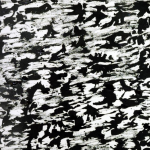2005
Jokes play a fundamental role in Slavoj Žižek's philosophizing. Is Žižek joking when he extols the virtues of Christianity to the Left? Eric Dean Rasmussen analyzes Žižek's pro-Christian proselytizing as attacks on modes of PC-ness - political correctness and perverse Christianity - that sustain an undesirable neoliberalism.
Aron Pease introduces this collection of essays by Linda Brigham, Caren Irr, William Wilson and Nick Spencer with a look at the multitude's programmability.
Chris Stroffolino responds to Lori Emerson
Lori Emerson reviews The Shape of the Signifier by Walter Benn Michaels.
2004
The second in a series of two essays developing the parallels between Iraq and the Peloponnesian Wars, between classical Empire and postmodern Imperialism.
From the Oracle of Delphi to the Wizard of Oz, it is clear that "if we attack we will destroy a great empire." The only question that remains, is which one?
R.M. Berry on the recuperation of politicized language, in (and through) the fiction of Marianne Hauser and Lidia Yuknavitch.
A Review of Malise Ruthven's A Fury for God: The Islamist Attack on America, from Tim Keane, with links to a growing body of writing on terror in ebr.
"The plot offers not so much progress as recurrence, duplication, and reiteration." Flore Chevaillier offers one way to fill in the gaps of Joseph McElroy "Canoe Repair."
Slavoj Žižek addresses the situation of post-9/11 global politics - and his own, controversial, theories of the political - in this interview with Eric Dean Rasmussen.
Davis Schneiderman reviews two works on Burroughs - a writer who is both there and not there, who exemplifies and escapes post-structuralist readings and postmodernist celebrations.
Jenny Weight reviews William Mitchell's third book, Me++: The Cyborg Self and the Networked City.
2003
Marc LaFountain reviews a new collection of Bataille's writings and considers the philosopher's thoughts on prayer in a system and practice of atheology.
Pattern, absence, routine, return - Dave Ciccoricco mulls the shape(s) in Michael Joyce's new paper novel, Liam's Going
On the occasion of a new novel by Joseph McElroy and the Overlook Press reissue of McElroy's earlier work, Andrew Walser initiates a revaluation.
Further on McElroy and a novel that reflects the mind's helter-skelter workings while (for the protagonist) creating many occasions for avoidance.
Shells, Tents, Slaps, Shocks: Steffen Hantke works slowly, from within, to get at McElroy's nonlinear narrative.
Ralph Berry on Avant-Garde fiction and the future of the page.
Lance Olsen continues the FC/2 authors' discussion of Carole Maso's AVA and adds some bits on Laird Hunt, Mark Z Danielewski, Judd Morrissey and Lori Talley, and other recent U.S. avant-gardists.
